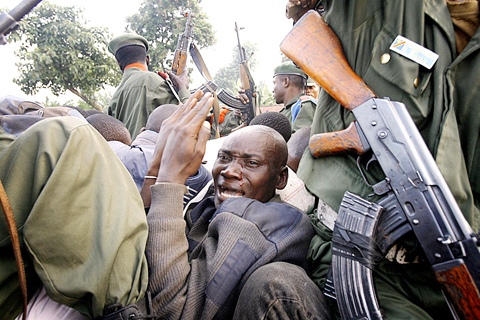Thousands of people displaced by fighting in the Democratic Republic of the Congo (DRC) have stoned UN vehicles at a refugee camp in anger at the organization’s failure to protect them.
Soldiers who had stopped the UN peacekeepers’ convoy at an impromptu roadblock at the Kibati camp on Sunday then dragged a group of men off the trucks, accusing them of being rebels.
The UN peacekeepers’ spokesman, Lieutenant Colonel Jean-Paul Dietrich, said 10 surrendered rebels were among these men, and that they were to have been turned over to the military yesterday, “but because of this incident, it was agreed on the spot to hand them over.”

PHOTO: AP
He said the others were 10 police and three civilians, but he did not know why they also had been taken.
The refugees at Kibati, 6km north of the regional capital of Goma, are among 250,000 people driven from their homes by the latest round of a rebellion that erupted in August.
Some refugees blame the UN for their plight, in failing to protect them from atrocities they say were committed by both rebels and government troops.
Congolese at Kibati camp hurled stones at the convoy on Sunday and at journalists accompanying it, as they have done several times before in the past few weeks.
“We are very unhappy about what [the UN] is doing here,” said Boyazo Ruzuba, 29, a resident of Kibati. “Before [the peacekeepers] came, we had peace. Now, we don’t have peace. They are helping rebels.”
The 17,000 peacekeepers whose primary mandate is to protect the local people are badly overstretched, the UN says, and it has approved deployment of 3,100 reinforcements.
Rebel leader Laurent Nkunda says he is protecting the DRC’s minorities, especially ethnic Tutsis he says are threatened by Hutu militias from Rwanda, many of whom fled to the DRC’s forests after participating in Rwanda’s 1994 genocide. Critics accuse Nkunda of exploiting the instability to gain power, and say his attacks have increased resentment against Tutsis.
The government, whose badly trained and ill-disciplined forces have frequently fled the fighting, refuses to negotiate with the rebels.
Displaced Congolese are threatened as well by diseases that breed rapidly in the crowded and unsanitary camps. On Sunday, an aid group sent the first post-fighting batch of medical supplies to a ravaged eastern DRC town.
Louise Orton, a spokeswoman for London-based medical aid group Merlin, said the medication went to 20 clinics around the towns of Kanyabayonga and Kirumba, more than 100km northeast of Goma, for the first time since the towns were captured during a rebel advance. Up to 40,000 people depend on the supplies.
Also on Sunday, officials in Goma clamped down on the illegal sale of food aid in the city’s bustling markets.
Goma Mayor Roger Rashiy said local police spotted sacks of maize flour bearing the World Food Programme logo in the local market, which led to the seizure of some 40 tonnes of food aid and the arrest of several vendors. Authorities said the food will be returned to aid agencies to be distributed.

POLITICAL PRISONERS VS DEPORTEES: Venezuela’s prosecutor’s office slammed the call by El Salvador’s leader, accusing him of crimes against humanity Salvadoran President Nayib Bukele on Sunday proposed carrying out a prisoner swap with Venezuela, suggesting he would exchange Venezuelan deportees from the US his government has kept imprisoned for what he called “political prisoners” in Venezuela. In a post on X, directed at Venezuelan President Nicolas Maduro, Bukele listed off a number of family members of high-level opposition figures in Venezuela, journalists and activists detained during the South American government’s electoral crackdown last year. “The only reason they are imprisoned is for having opposed you and your electoral fraud,” he wrote to Maduro. “However, I want to propose a humanitarian agreement that

ECONOMIC WORRIES: The ruling PAP faces voters amid concerns that the city-state faces the possibility of a recession and job losses amid Washington’s tariffs Singapore yesterday finalized contestants for its general election on Saturday next week, with the ruling People’s Action Party (PAP) fielding 32 new candidates in the biggest refresh of the party that has ruled the city-state since independence in 1965. The move follows a pledge by Singaporean Prime Minister Lawrence Wong (黃循財), who took office last year and assumed the PAP leadership, to “bring in new blood, new ideas and new energy” to steer the country of 6 million people. His latest shake-up beats that of predecessors Lee Hsien Loong (李顯龍) and Goh Chok Tong (吳作棟), who replaced 24 and 11 politicians respectively

Archeologists in Peru on Thursday said they found the 5,000-year-old remains of a noblewoman at the sacred city of Caral, revealing the important role played by women in the oldest center of civilization in the Americas. “What has been discovered corresponds to a woman who apparently had elevated status, an elite woman,” archeologist David Palomino said. The mummy was found in Aspero, a sacred site within the city of Caral that was a garbage dump for more than 30 years until becoming an archeological site in the 1990s. Palomino said the carefully preserved remains, dating to 3,000BC, contained skin, part of the

Russian hackers last year targeted a Dutch public facility in the first such an attack on the lowlands country’s infrastructure, its military intelligence services said on Monday. The Netherlands remained an “interesting target country” for Moscow due to its ongoing support for Ukraine, its Hague-based international organizations, high-tech industries and harbors such as Rotterdam, the Dutch Military Intelligence and Security Service (MIVD) said in its yearly report. Last year, the MIVD “saw a Russian hacker group carry out a cyberattack against the digital control system of a public facility in the Netherlands,” MIVD Director Vice Admiral Peter Reesink said in the 52-page